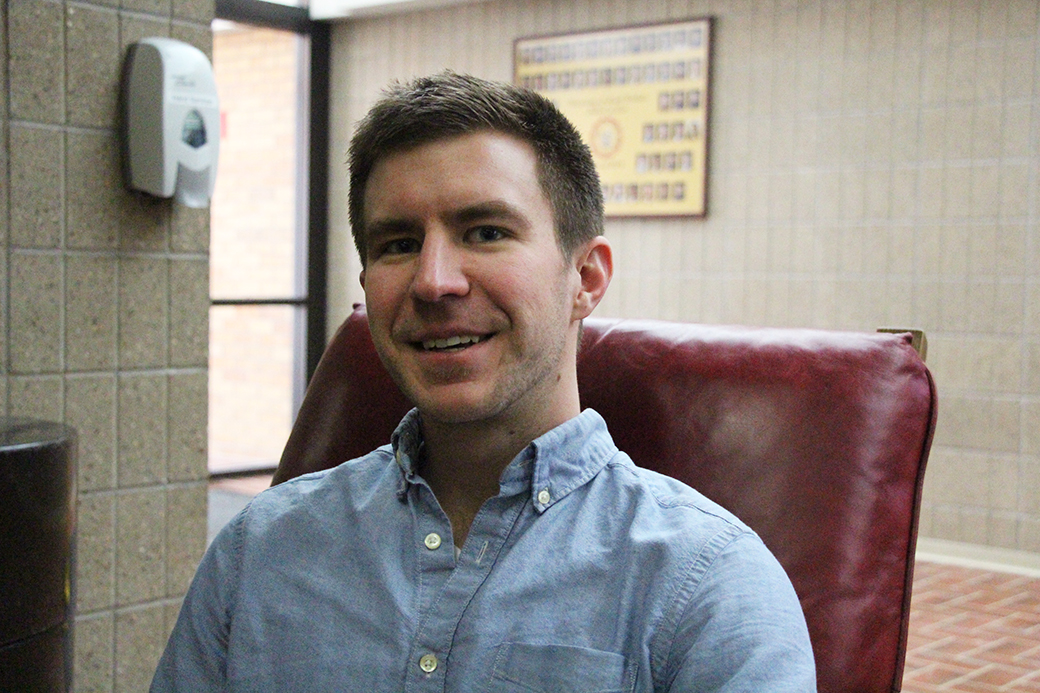
Law student hopes to curb food waste, help community
A USD law student is working to reduce the amount of campus food that’s wasted and distribute it to those in need throughout the community.
Each week, the three on-campus convenience stores at USD – the Beede Bump, U Brew and the POD Market – “throw out a fair quantity of food” that’s near to its expiration date, said Eric Schlimgen, a third-year law student also working on a master’s degree in public administration.
So, as Schlimgen was preparing for his public administration capstone project, he decided it should address the issue of food waste on campus, and figure out a way to make better use of this food.
“I wanted to do something that was beneficial to the USD and Vermillion community, and to not just say how it would be implemented, but actually implement it,” Schlimgen said.
More than 12 percent of South Dakota’s population has been food insecure in recent years, according to Feeding South Dakota’s Hunger Facts. In Clay County alone, as many as 2,190 people are food insecure.
And yet, across the U.S., nearly 100 billion pounds of food go to waste each year, according to Feeding South Dakota.
Schlimgen chose to try to tackle the issue of on-campus food waste and community food insecurity simultaneously with a three-part plan.
The first segment of his approach involves on-campus convenience stores donating their baked goods, produce and other foods with limited shelf life that are often discarded to the local organization Feeding Vermillion.
“I want to take that food and, instead of having it be thrown away, be collected and taken to a Feeding Vermillion location,” he said.
And, Schlimgen added, thanks to state and federal laws including the Bill Emerson Good Samaritan Food Donation Act, convenience stores donating the aging food would be protected from all liability stemming from any consequence of the condition of the food, as it was given to charity in good faith.
His second proposal would give students the option to donate a set amount of their Coyote Cash or Flex money to Feeding Vermillion.
“When students go to a USD convenience location, they can have the option of donating $1, $5 or $10 of Coyote Cash/Flex to Feeding Vermillion,” Schlimgen said. “So at the end of the year when they have $300 of excess Flex or Coyotes Cash, they can donate that,” instead of going on a last-minute splurge to use up the remaining funds.
This part of the plan also includes a “sub-part,” which would involve “placing food donation boxes outside of USD convenience store locations, so if people choose to purchase the food, they can then donate it immediately,” he said, adding “whatever goes in the box is helpful.”
The third portion of Schlimgen’s strategy involves enabling student groups to use a Coyote Card swipe machine for tabling events, which would enable students to pay with Coyote Cash or Flex when purchasing something from a student group, and could also be used to fund Feeding Vermillion.
“Instead of limiting organizations to having to rely on students carrying cash, they can sell tickets to a soup feed or student art thing, and students can swipe their card and purchase items,” he said.
Feeding Vermillion would see a benefit because “student groups could be tabling on behalf of Feeding Vermillion, and that student group would make the donation of that money to Feeding Vermillion,” Schlimgen said.
As Aramark is in charge of all of the on-campus convenience stores, an official from the company is scheduled to meet with Schlimgen this coming Monday to discuss his proposals.
Schlimgen took his cause to SGA Tuesday night, proposing two bills, one of which is a resolution of support from SGA of his food saving policies, and one in which SGA furnishes a card reader per his proposal.
Though the bill supporting his food recovery proposal encountered little opposition in SGA, the bill supplying a card reader – which could cost $1,600 or more – ran into opposition from some senators.
During the conversation, Senator Diego Marquez questioned whether college students would actually part with Coyote Cash or Flex funds willingly, as college students themselves are likely to have strained financial resources.
Senator Nathaniel Steinlicht asked whether the Coyote Cash or Flex funds, which he described as being akin to “Monopoly money,” can be used by an organization such as Feeding Vermillion to purchase food from a third party, which Schlimgen was not entirely sure of.
The SGA resolutions in favor of Schlimgen’s proposals are set to be voted on at next week’s meeting.
Feeding Vermillion supports Schlimgen’s proposals, said John Lushbough of Feeding Vermillion.
“Anything we can do to reduce food waste is well worth the effort,” Lushbough said, adding “this seems like a workable way.”
“(It’s) great idea as far as I’m concerned,” he said.


